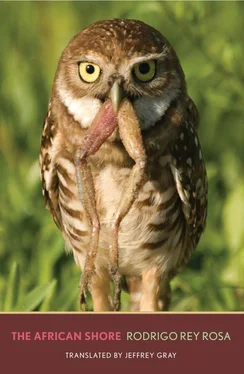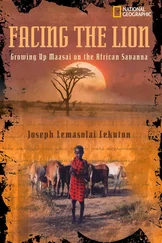Before going back to Spain, his uncle visited the hut where Hamsa lived. Little Ismail was there, helping Hamsa mark the sheep they would sell that Sunday in the market.
“Bghit n’hadar m’ak,” said his uncle. “I want to talk to you.”
Hamsa told Ismail to get lost, and the boy ran out and disappeared behind some rocks. The uncle sat down on a stool that Hamsa kept in the shadow of a twisted fig tree, and Hamsa squatted in front of him, wiping the grime off his hands on the folds of his gandura.
“Iyeh?”
Was Hamsa ready to do the work? All his uncle asked was that Hamsa watch a certain part of the coast during one night. A speedboat with Jalid in it would approach the coast from Cádiz, and Hamsa would have to send signals with a lantern. Was Hamsa capable of spending the whole night awake, alert, so that no one, neither gendarmes nor soldiers patrolling the beach, would surprise them?
Of course he could do it, Hamsa said. He was already thinking of the various ways he knew to fight off sleep, like eating red ants or the dirt of an ant hill, drinking water with lice, or wearing an amulet made from an owl’s eye.
“I knew I could count on you,” his uncle told him. “You’re a winner. You’ll have cars and as many women as you want — even though they really cause a lot of problems.” He smiled.
Jalid returned to Spain a few days later, and before long he sent news to Hamsa. They would decide soon on the exact date and place.
It was nearly noon and the wind had almost dried his clothes when he set the lamb on the ground beside the fig tree. It shook itself violently and sneezed. Then it ran toward the corral of rocks and thorns to be near the flock and stood trembling against the fence in a patch of sunlight.
Hamsa went into the hut, blew on the embers that were still glowing in the brazier, and began to prepare his tea. Then he went out into the sun and sat down under the fig tree with his kif pipe. But smoking soon gave him a light headache, and Hamsa knew he had been struck by the berd, the cold that could pierce one to the bone. The wind was still blowing cold and hard; it had grown worse since sunrise.
In the afternoon, he took the flock as far as the pasture at the foot of the ruined house. He carried his lyre with him, but he didn’t play it. Water flowed from his nostrils.
When the sun went down behind the mountain, Hamsa began to drive the flock back to the corral.
— Derrrrrr! Derrrrrr!
After counting the animals, he boiled some sheep’s milk in a saucepan, drank a little, and fell asleep on a cushion of sheepskins, covered with a woolen shawl. Later, stretched out in the darkness, he felt the bite of the cold in all his bones. The sound of the wind nauseated him. He woke several times with the sensation that he was falling. He sank into his sickness. What would happen if his uncle called for him this very day? he wondered.
He woke up late, after dawn, drenched in sweat. When Ismail lifted the curtain of the hut to look inside, the daylight blinded Hamsa.
“Are you sick?” asked Ismail. “What’s the matter?”
Hamsa sat up.
“The cold.”
The boy came inside and sat down next to him. He kept looking at him in silence.
“What shall we do?” he asked.
Hamsa opened and closed his eyes.
“You know what would do you good?” said Ismail. “Some milk with pennyroyal.”
“I’ve got milk here. Do you know where to get pennyroyal?”
“No.” The boy stood up.
“Go and ask for a handful from my grandmother.”
When the boy had gone, Hamsa sank back into a dream. A battle of swords that turned out to be bulrushes or reeds, then a rain of pebbles.
“Aulidi,” said the voice of his grandmother, but she was not speaking to him. “Go tell Si Mohammed that Hamsa is sick and that he should send someone to look after the sheep. I’m going home now to talk with madame (who wouldn’t mind putting him up for a few days, they knew how generous she was) and I’ll be back in a taxi for him.”
Ismail did not move. He stared at her with an expression that the old woman understood.
“Ah, you want money. Here, a hundred francs.” She dropped a coin in the boy’s little hand, which closed on it quickly.
In the tool shed where they made a bed for him, Hamsa spent two days burning with fever. His grandmother made him drink milk with pennyroyal, fed him pennyroyal couscous, and rubbed his body with sheep grease, to which also she added pennyroyal powder.
“Drink this, my son. You’ll be better soon.”
Mohammed had sent Ismail to tell Hamsa not to worry, that old Larbi would take care of the flock while he was gone. Mohammed also sent fifty dirhams to pay for medicine, but Fátima didn’t think much of the medicine of the Nazarenes, and she put away the money for future needs.
On the third morning, still weak and painfully stiff in his neck and shoulders, Hamsa stood up and took a few steps around the room. Later, he went out into the garden. The east wind was blowing hard as ever, and the sky was clear. The sun, mirrored a thousand times in the leaves, hurt his eyes so much he quickly went back inside to the comfort of the darkness.
At noon, his grandfather brought him chicken stew and sat down to have lunch with him.
“Now you’re better,” he said. “Tomorrow you’ll go back to work.” He drew from his jacket Hamsa’s motui, the kit containing his pipe and kif, and put it on the mat with a gesture of tolerant disapproval. “Ismail brought this for you.”
In the afternoon, when the light was softer and the wind had calmed, Hamsa went out into the garden again. He sat down in a raised section near an old monkey tree that grew on the other side of a bed of lilies. From there, behind the cane fence in the lower part of the garden, he could see the white hills of Tangier and the ocean. He watched a woman come out of the little guest house at the far end of the garden. He stopped smoking. She wore blue jeans and a white shirt, and her long blond hair was loose and damp. She wasn’t young, but she wasn’t old either. She crossed the garden by the flagstone path and turned into the main house. Hamsa smoked another pipe of kif. Now a man, who could have been Moroccan but who, judging by his clothes and way of walking, must have been European, came out of the guest house and followed the woman’s steps up the gravel path. “Whore,” Hamsa thought. A little later he could hear Madame Choiseul’s car start and Fátima’s voice shout at Artifo to open the gate. The noise of the car faded as it went down toward the city, and Hamsa took up his pipe again, dreaming that he was a rich man and that the garden was his.
The garden was deserted now. A crane, very white in the afternoon sun, had perched next to the Nazarene’s lion’s-head fountain. It flew off when Hamsa walked down the path toward the guest house. Hamsa circled the house, came up to a window, and peered inside. He saw an owl perched on the back of a chair with a carpet of newspapers spread under it. The owl, which had a fallen wing, seemed to be asleep. Hamsa tapped the pane with his finger. The owl turned its head around and looked at him.
“Yuuk,” the owl said to Hamsa. “Yuuk.”
Everyone knew that owls don’t sleep at night and that they can see in the dark. This was why, when someone wanted to stay awake all night, it was a good idea to catch an owl and pull out its eyes. Some people boiled the eyes in water and ate them, or you could make an amulet with one of the eyes and wear it on your chest to keep off sleep.
Hamsa returned to the tool shed and smoked several pipes of kif, thinking of what he should do.
Читать дальше












